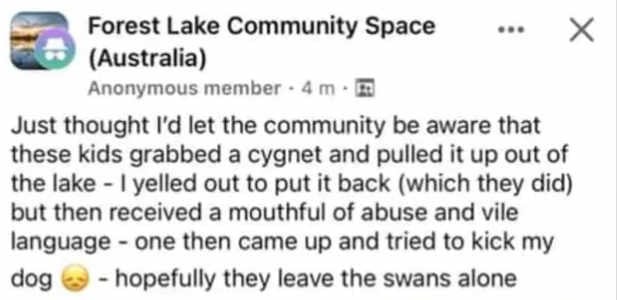The iconic black swan pair at The Lake recently welcomed six cygnets in late May 2024. By June 8, one baby swan was already missing from the brood.
With survival statistics at the lake so grim for the cygnets, residents have been diligently rushing to play their part by reminding each other on social media about protecting wildlife.
The black swan population has been on a constant decline at Forest Lake, with only one swan hatched during the last decade appearing to survive to adulthood.
Most recently in July 2023, three out of four cygnets died within a month of hatching. The sole survivor was euthanised by the RSPCA on September 3 after suffering from severe foot and beak injuries caused by a predator.
Earlier in March 2023, another brood of five swans all died within just 10 days of hatching.
In April 2023, an adult swan at the lake had to be euthanised by the RSPCA after sustaining severe damage to her oesophagus caused by a fishing hook and line.
On June 9 a group of children aged between the ages of 6 and 16 alleged grabbed one of the cygnets from the lake, but returned it to the water after being confronted by an onlooker.
The group was later spotted a second time allegedly trying to steal one of the cygnets away from the lake heading up the path towards Simple Bliss, more than 100 metres from its parents. It was returned to the lake by a couple who confronted them.

Residents are remaining on alert, binding together to keep an eye on the baby swans while spreading as much awareness on social media as possible.
In order to help preserve the local wildlife at The Lake, the RSPCA recommends the following:
Don’t feed wild animals: this causes them to lose their natural instincts to forage for food and they may also fail to teach their young how to forage for food. It also decreases their wariness of predators, making them more vulnerable to dogs, cats and other threats. Human food is also not suitable for wildlife and can cause them to become ill or malnourished.
Be on the lookout: if you see a young bird separated from its parents, or come across a sick or injured bird, contact the RSPCA on 1300 264 625, open 24 hours, 7 days a week.
Don’t approach wild animals: this can scare the parents away and cause them to abandon their young, leaving them unprotected and vulnerable.
Don’t litter: each year the RSPCA receives thousands of callouts to animals endangered by litter, with swans and other water birds impacted the most. Dispose of all rubbish and fishing litter correctly, and if you notice rubbish nearby you can help out by putting it in the bin.
